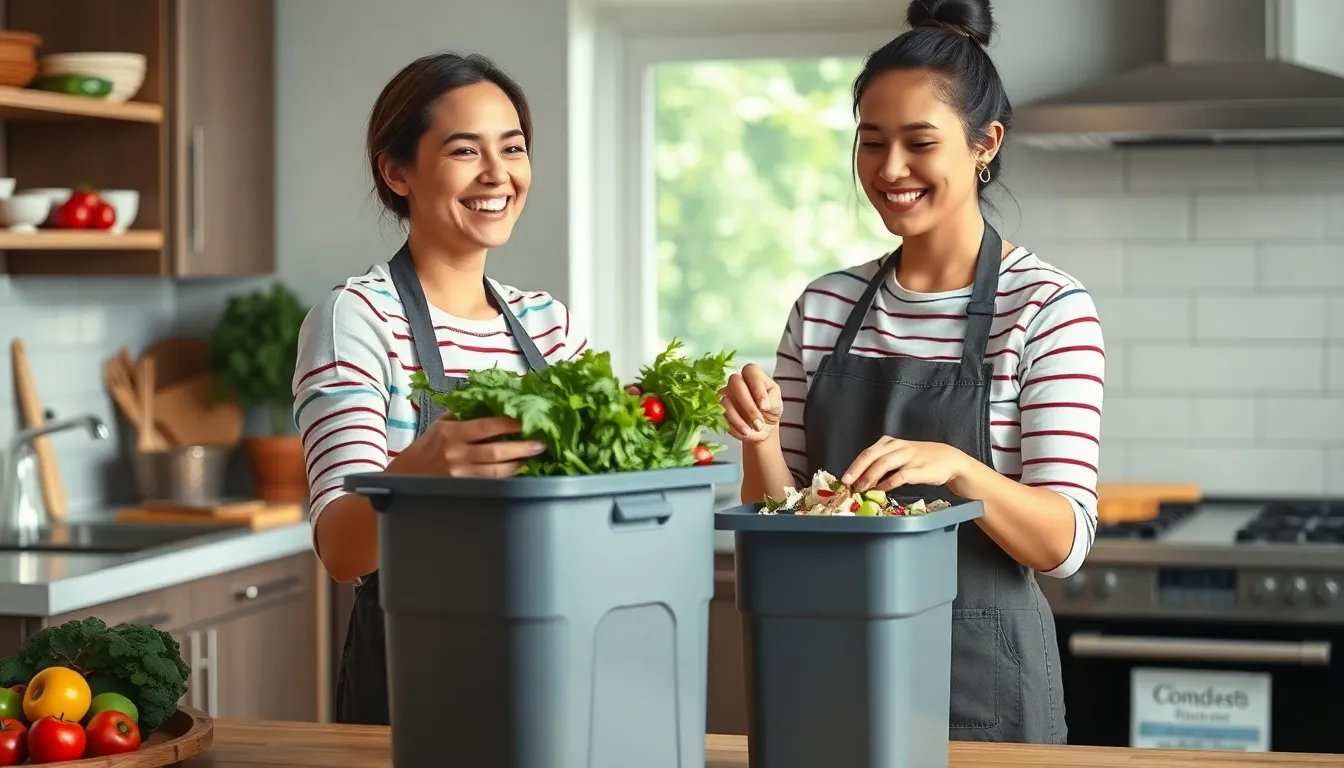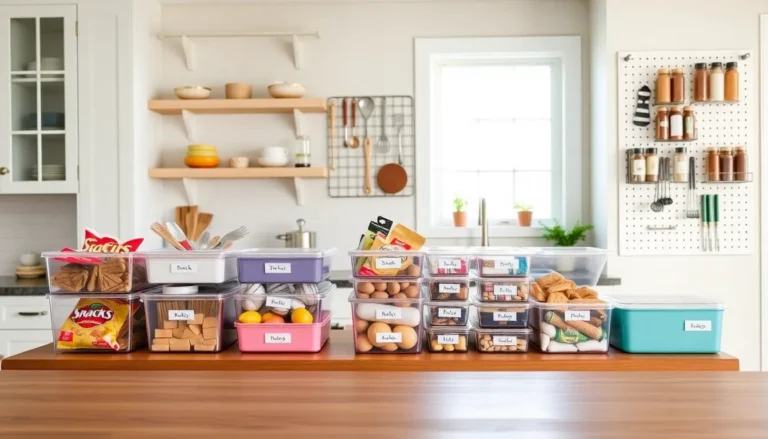Table of Contents
ToggleIn today’s world, kitchen waste has become a pressing issue. With households generating tons of food scraps and packaging waste, the environmental impact is staggering. Reducing kitchen waste isn’t just a trend; it’s a necessary step toward sustainability. By making small changes, anyone can contribute to a healthier planet while saving money and resources.
Embracing kitchen waste reduction practices can transform the way people approach cooking and meal planning. From composting to smart shopping, every action counts. This article explores effective strategies for minimizing waste in the kitchen, helping readers make informed choices that benefit both their homes and the environment. Join the movement toward a more sustainable kitchen and discover the simple yet powerful steps that can lead to significant change.
Understanding Kitchen Waste Reduction
Understanding kitchen waste reduction involves recognizing its critical role in improving sustainability. Addressing various sources of waste leads to more eco-friendly practices in households.
Importance of Reducing Kitchen Waste
Reducing kitchen waste significantly decreases the amount of refuse that ends up in landfills. Landfills generate methane, a potent greenhouse gas that contributes to climate change. By lowering waste, households also conserve resources used for production, packaging, and transportation. Additionally, saving money through efficient meal planning and mindful shopping practices becomes a tangible benefit for individuals.
Common Types of Kitchen Waste
Common types of kitchen waste include:
- Food Scraps: Leftovers, fruit peels, and vegetable trimmings that result from meal preparation.
- Packaging Waste: Cardboard boxes, plastic containers, and foil wrappers associated with grocery items.
- Expired Items: Perishable foods that spoil before consumption typically include dairy, meat, and fresh produce.
- Disposable Items: Single-use kitchenware, such as plastic utensils and plates, that contribute to overall waste.
- Unusable Ingredients: Ingredients like stale bread or wilted greens that can’t be integrated into meals.
Identifying these waste types helps households implement strategies for reduction, leading to a more sustainable kitchen environment.
Strategies for Kitchen Waste Reduction

Effective strategies for kitchen waste reduction can significantly minimize environmental impact and enhance sustainability efforts. Implementing practical methods helps households maintain eco-friendly practices.
Composting Techniques
Composting transforms organic kitchen waste into rich soil amendments. Utilizing effective composting techniques includes:
- Bokashi Composting: This anaerobic process utilizes a special mix of microbes to ferment food waste, including meat and dairy, making it versatile.
- Hot Composting: This method requires a balanced mix of green (nitrogen-rich) and brown (carbon-rich) materials to reach high temperatures, speeding up decomposition.
- Vermicomposting: Red wigglers break down food scraps and produce nutrient-dense worm castings, suitable for indoor or small spaces.
Each composting technique reduces waste volume while creating valuable compost for gardens.
Meal Planning for Less Waste
Meal planning plays a crucial role in minimizing kitchen waste. Effective meal planning includes:
- Inventory Check: Assessing existing ingredients helps prevent over-purchasing and ensures items are used before expiration.
- Batch Cooking: Preparing large portions of meals makes efficient use of ingredients, allowing for leftovers that can be refrigerated or frozen for later use.
- Flexible Recipes: Utilizing adaptable recipes encourages creativity with ingredients, reducing reliance on specific items that may go to waste.
Implementing these strategies during meal preparation not only decreases waste but also saves time and money in the kitchen.
Innovative Tools for Kitchen Waste Management
Innovative tools play a crucial role in enhancing kitchen waste management. By utilizing smart appliances and reusable kitchen products, households can significantly minimize waste production.
Smart Appliances
Smart appliances streamline kitchen processes and reduce waste. Devices like smart refrigerators track food inventory, alerting users about items nearing expiration. Meal prep can be optimized with smart ovens that suggest cooking times and temperatures based on ingredient types. Food preservation devices, such as vacuum sealers, extend shelf life, preventing spoilage. Additionally, smart composters automate organic waste decomposition, producing nutrient-rich compost quickly. These technologies not only promote efficiency but also foster eco-conscious behavior in the kitchen.
Reusable Kitchen Products
Reusable kitchen products significantly cut down on waste generated from single-use items. Alternatives include silicone food storage bags, which replace plastic bags, and beeswax wraps that serve as substitutes for plastic wrap. Stainless steel or glass containers offer durable storage options, reducing dependency on disposable packaging. Compost bins with tight seals minimize odor and leakage, encouraging composting practices. Election of these reusable items promotes sustainable habits and reduces overall kitchen waste.
Community Initiatives for Kitchen Waste Reduction
Communities play a vital role in reducing kitchen waste through organized initiatives. These programs promote sustainable practices, educate residents, and facilitate collaboration for waste reduction.
Local Recycling Programs
Local recycling programs focus on diverting kitchen waste from landfills. Many areas offer curbside recycling for plastics, glass, and paper, while some cities provide organic waste collection services. Residents can participate by sorting materials correctly and following municipal guidelines. Effective local programs often include drop-off centers for items not accepted in curbside collection. For example, food scrap drop-offs enable communities to compost organic materials, turning waste into nutrient-rich soil. Collaboration between local governments and residents enhances participation and overall environmental impact.
Educational Workshops
Educational workshops provide essential training on kitchen waste reduction techniques. These sessions focus on practical skills, such as meal planning, composting methods, and effective food storage strategies. Workshops often feature expert speakers who share tips on minimizing food waste and highlight the benefits of sustainable practices. Participants learn to make informed decisions about food purchases, thereby reducing waste at the source. Communities can host these workshops in partnership with schools, libraries, or local organizations to maximize reach. Regular sessions encourage ongoing engagement, fostering a culture of sustainability within the community.
Embracing kitchen waste reduction is essential for fostering a sustainable lifestyle. By adopting simple practices like composting and smart meal planning, individuals can significantly decrease their environmental footprint. The integration of innovative tools and community initiatives further amplifies these efforts, creating a culture of sustainability that benefits everyone.
Every small change contributes to a larger impact, empowering households to make informed choices. As awareness grows, so does the collective ability to combat climate change and conserve valuable resources. It’s time to take action and transform kitchens into eco-friendly spaces that reflect a commitment to a healthier planet.







